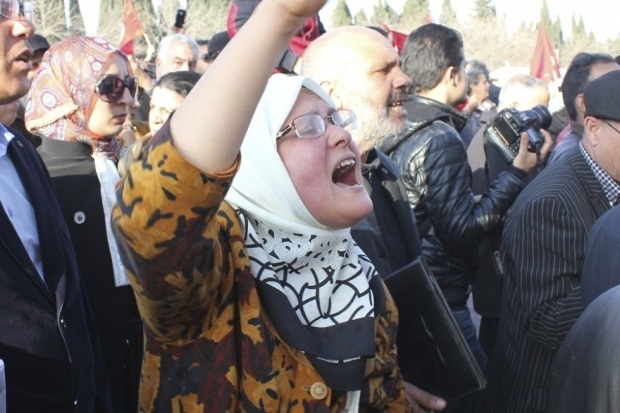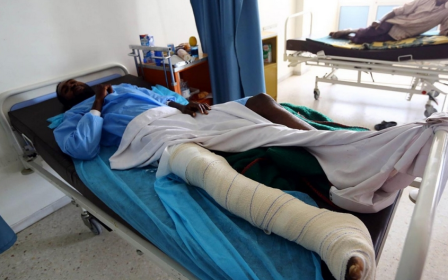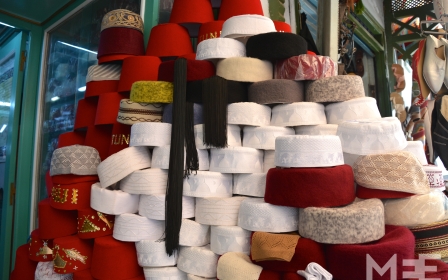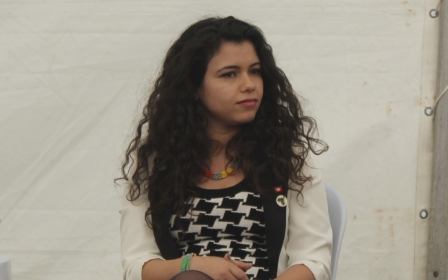Tunisian journalists face intimidation and low wages

The Tunisian media sector has undergone drastic changes since the 2011 revolution. In four years of transition, dozens of new media outlets have been opened, and journalists have felt free to write about politics for the first time in years. Yet despite these improvements, journalists are still operating under fragile conditions.
“In 2014 we recorded 277 assaults against journalists, but accountability was absent,” said Mahmoud Dhaouadi, the president of the Tunis Centre for Press Freedom, an organisation established shortly after the revolution to monitor government commitment to freedom of press.
The organisation has titled its 2014 annual report “Impunity”, as most cases, violations against the press did not reach court.
Despite a positive climate of openness, journalists are still subject to intimidation, pressure and violence. In the wake of recent militant attacks on Tunisia’s National Bardo Museum, in which 22 people, mostly tourists, were killed, there are fears that the government will use security concerns to clamp down on press freedom.
Tunisia’s Ministerial Council in April approved a draft law for the protection of the armed forces. The bill, which is due to be revised in parliament, has sparked an outcry from media and activists.
Clampdown post-Bardo attack
The Tunisian Journalist Syndicate (SNJT) has called for the scrapping of the bill, describing it as a scandal and a setback to constitutional gains. The proposed legislation puts into question how the country will balance security and hardfought post-revolution freedoms.
“We know that considering the current situation, security forces are in shock, but they continue humiliating journalists as if they are part of the problem. In the name of fighting terrorism, journalists are paying the price,” said Dhaouadi.
Dhaouadi believes that the proposed law of banning assaults on the armed forces will not survive, as it contradicts the spirit of the new constitution, freedom of expression and access to information celebrated after the revolution.
“We have an unprecedented openness that is not common in the countries of the region, but the test of this success is the ongoing threats on journalists’ gains,” said Dhaoudi. “We are not waiting for the political power to protect freedoms; it is the role of civil society to keep a watchful eye.”
In March, the Tunis Centre for Press Freedom reported 24 assaults on journalists, most of which were perpetrated by security forces.
“Journalists are being arrested, intimidated and questioned over what they write. There is an ongoing campaign against journalists for being biased. We are threatened more than before,” said Syrine Guediche, a Tunisian journalist working for private TV channel, Al Hiwar Eltounessy.
Tunisian journalists have experienced the freedom to report and write, but these freedoms are restricted for many, as the accessibility of information is still a big struggle for journalists.
“As journalists out in the field, we face many problems. Just preparing a simple package turns out to be a hard mission. We face multiple problems coordinating with ministries and public administration. They do not take our work seriously,” said Heba Akoubi, a journalist for local radio station Oasis Gabes.
A common belief among journalists is that government officials view them as troublemakers that need to be avoided, according to Akoubi. However, some journalists are treated differently depending on their media outlet. For Akboubi, journalists working for state-run media find it easier to obtain access than those working for other outlets.
Arby Mahjoub, a Tunisian cameraman working for Anadulou Agency, agrees with Akboui. He added that international journalists are also treated differently." In many big events such as the Bardo Museum march, international media were given easier access to cover the visit of high-profile visitors unlike Tunisian journalists,” Mahjoub said.
Bilel Fattoum, a Tunisian journalist who began working in journalism in 2010, said that he had found out more difficulties after the revolution. “I spent 15 days trying to schedule an interview with an official. There is no respect for the right to information. To be able to get things done, you need connections.”
Fattoum, who previously presented a TV show on the private channel, Al Janoubia, told Middle East Eye that he was assaulted once in a public administration office while he was trying to get an interview with an official, and the cameraman accompanying him was banned from filming as well. “They do not respect journalists. They want everything hidden and they don't want citizens to know, they don't want anything with criticism to be broadcast,” Fattoum said.
Fragile working conditions
Despite the general climate of freedom in Tunisia since the revolution, which has benefited the press, the social demands of journalists in Tunisia were never met, and they are still struggling with financial instability and frail employment.
“Journalists are unable to secure decent contracts with reasonable stability. Some journalists are paid between 300 ($150) and 400 dinars ($200),” says Syrine.
Print Journalists are planning to go on a two-day strike in May to demand a pay raise. According to the Media Union, a branch of Tunisia’s General Labor Union that called for the strike, journalists are the only employees who did not benefit from the 2014 wage increase.
“Journalists’ salaries are very low - they bring shame to the sector. Some regional correspondents are paid just 110 dinars ($55) a month.” Akoubi said.
Although following the revolution, many new media outlets were opened, Tunisia has a relatively small number of media companies compared to other countries in the region, like Egypt. Thousands of journalism graduates spend years trying to find a job in the sector, and they end up accepting working with no contracts or social security.
“I spent seven years trying to work for the national channel or radio … but they have made it impossible for a recent journalism graduate to work in state-owned media," said Fattoum. “They do not encourage the young; they do not want to give them a chance. Journalists with over 30 years working experience make it impossible for new beginners to get in.”
The harsh economic situation that many Tunisian journalists face may also encourage them to compromise their independence from political power.
“When journalists are not well paid, they will form allegiances and get paid for it because they have families to support,” said Akoubi.
“Four years after the revolution, the status of Tunisian journalists has improved, but their financial situation is shameful compared to other journalists in the world,” said Dhaouadi. “Tunisian journalists are working under the pressure of financial and political corruption. We have to admit that it is unreasonable if we expect impartiality while they are working in such poor conditions with no rights.”
“Journalists’ problem is that they do not stand up for themselves. There is a legal minimum wage but they are not aware of their rights, and media outlets are not held accountable for not respecting the law,” said Akoubi. “A decent wage means a respected journalist. It means dignity.”
New MEE newsletter: Jerusalem Dispatch
Sign up to get the latest insights and analysis on Israel-Palestine, alongside Turkey Unpacked and other MEE newsletters
Middle East Eye delivers independent and unrivalled coverage and analysis of the Middle East, North Africa and beyond. To learn more about republishing this content and the associated fees, please fill out this form. More about MEE can be found here.




